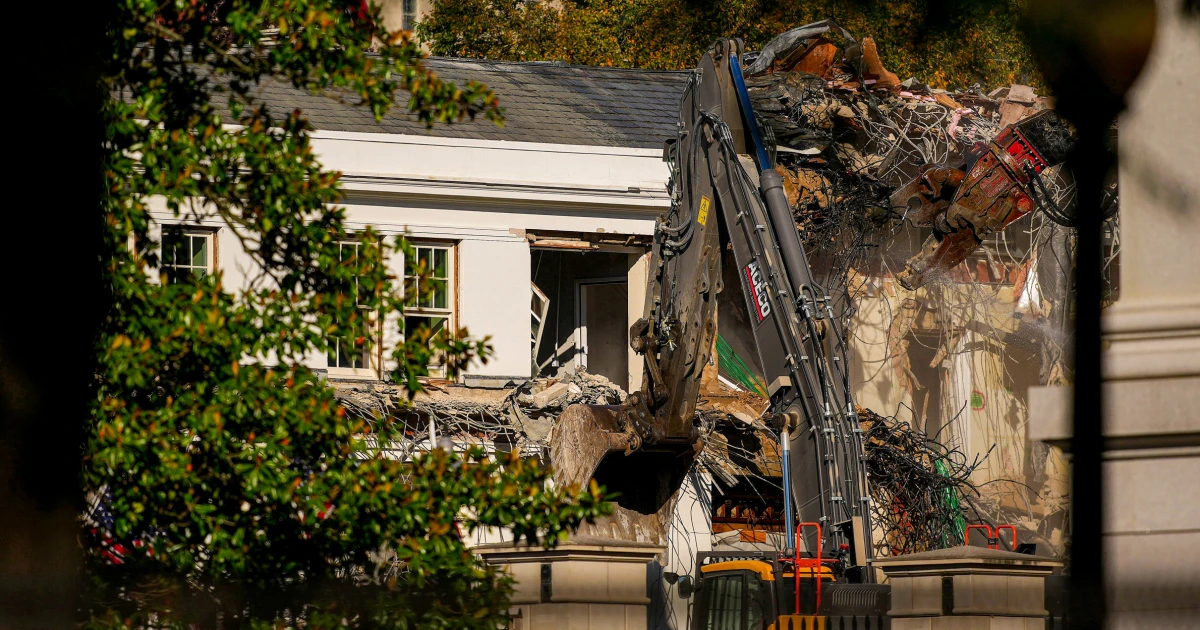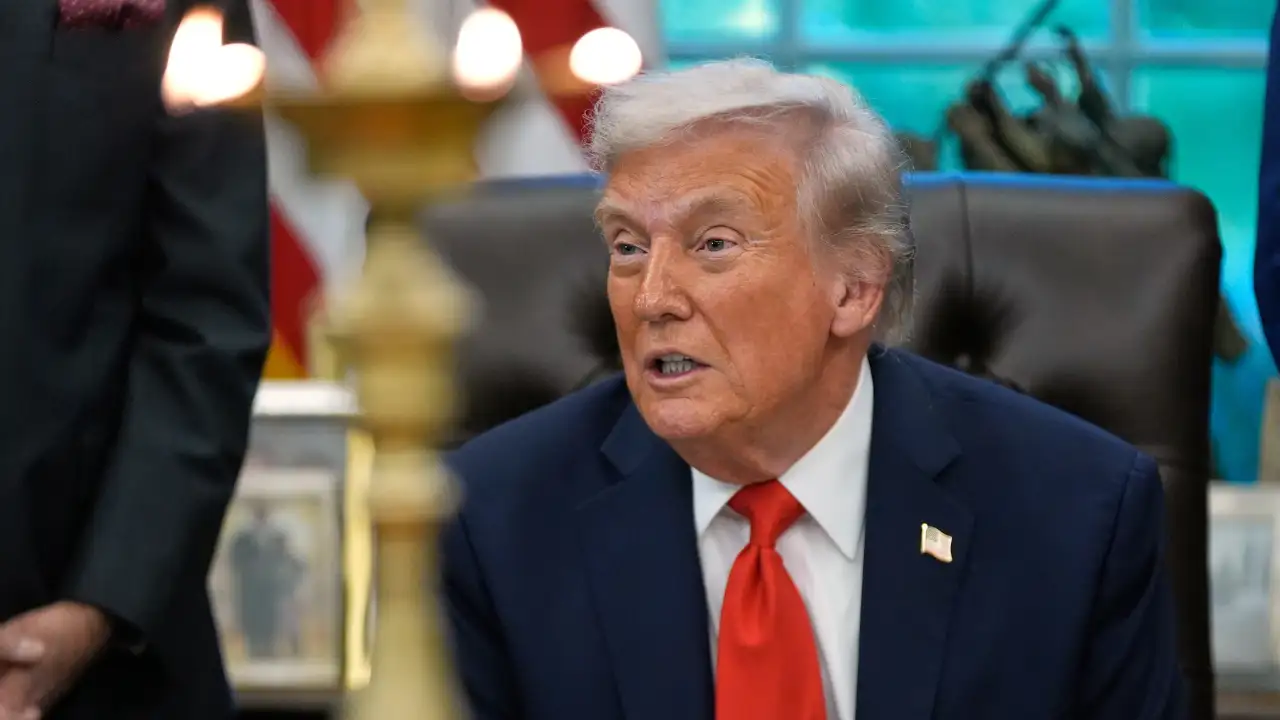Copyright NBC News

WASHINGTON — Over the years, a genteel nonprofit organization called the Trust for the National Mall has raised money to help care for the cherry trees dotting the Tidal Basin. It upgraded the U.S. Park Police stables on the National Mall and hosted pickleball games on the grassy expanse between American monuments. Now it has a new assignment: handling the millions of dollars pouring in for President Donald Trump’s gilded White House ballroom. The nonpartisan group is serving as the steward for what Trump has said is more than $350 million in private donations from individuals, foundations and corporations to remake part of the old East Wing into a 90,000-square-foot ballroom. Donors have been instructed to direct their ballroom contributions to the trust, a tax-exempt nonprofit organization. Individual and corporate donors can typically deduct the amount they contributed from their federal income taxes. A person raising money for the ballroom told NBC News that they have been asking for donations of $2.5 million to $5 million and that the deduction is one reason people choose to give. The fundraiser, like others in this article, was granted anonymity to speak candidly. The White House said donors will be able to remain anonymous if they wish. The trust’s involvement in Trump’s project has plunged it into politically divisive terrain that it has avoided since its founding in 2007. Senators are demanding answers about what the trust knows about the ballroom and its donors and when it found out. “This nonpartisan, independent organization is about to be enmeshed in the very perilous quicksand of Donald Trump’s donation scheme for his ballroom,” Sen. Richard Blumenthal, D-Conn., said in an interview. Devoted to "restoring, preserving and enriching the National Mall," the trust is now part of a project that is transforming the symbol of American history and power. Construction crews flattened the East Wing of the White House this month to make way for a ballroom that can seat nearly 1,000 people; in July, Trump said the addition wouldn’t touch the White House. In interviews, trust officials stressed that they’re playing only the limited role of managing the donations and have no say over the design or construction of the ballroom itself. The group is an official partner of the National Park Service, the federal agency that maintains the White House grounds. Traditionally, the trust assists the Park Service by raising private money for projects, thus defraying the cost to taxpayers. Over the summer, the Park Service approached the trust and asked whether it would handle the private donations for the ballroom, a trust staff member said. The group’s 14-member board discussed the request and agreed to take part, board member Eric Hoplin, who is CEO of the National Association of Wholesaler-Distributors, said in an interview. Neither he nor the staff member would say whether the group could have declined to participate. Asked whether the trust knew in advance that the East Wing would be torn down, Hoplin said, “Because we weren’t involved in the design or construction, we were learning about the evolution of the project as others have.” He made no apologies for the ballroom, pointing to past White House renovations that also drew public ire back in the day. “If you look to history and you think about Andrew Jackson’s addition of the North Portico and you look at Teddy Roosevelt’s addition of the West Wing, when you look at the Truman restoration, including the Truman Balcony, each of those projects in their time was controversial,” Hoplin said. “Now they’re widely accepted and in fact celebrated parts of the White House. So it’s not for us to judge the project. We’re the partner of the National Park Service, and we are playing this limited role.” Born out of a philanthropic impulse, the trust seems a throwback to an era that predated Trump’s rise. The ballroom project is an arranged marriage of sorts between MAGA and civic magnanimity. Chip Akridge, head of a local commercial real estate firm, would regularly jog through Washington to look at his properties. A friend urged him to inspect the Mall’s condition, and when he did, he saw it was “a disgrace,” he told a House committee in 2008. Akridge said he helped create the trust to restore the Mall’s luster. Over the years, the trust has led a string of efforts to improve the Mall and surrounding spaces. During Trump’s first term, it managed $4 million in private donations for a pair of White House projects: a tennis pavilion and a renovation of the Rose Garden. Trump paved over the garden grass after he returned to office. The group brought in volunteers to help with White House garden tours, along with experts to "shape" White House educational tours in President Joe Biden's administration, the staff member said. Donors have been invited to “adopt” a cherry tree as part of the trust's effort to preserve the 3,700-some cherry trees on the Tidal Basin. A total of $42,000 was raised in 2023 to help protect 40 trees. The group also worked to upgrade horse stables on the Mall that were first built in the 1970s, among other projects. And it marshals volunteers for smaller projects, such as painting benches and laying mulch. Current board members aren’t Trump’s traditional MAGA allies. Some are in senior positions at corporations like Humana and Wells Fargo, while others are philanthropists who have supported major cultural and artistic endeavors. The group’s president and CEO is Catherine Townsend, who was appointed in 2016. That year, she donated $250 to the Democratic presidential campaign of Hillary Clinton, campaign finance records show. Townsend also made a pair of $250 donations to the Democratic Congressional Campaign Committee in 2010. The trust didn’t make Townsend available for an interview and didn’t respond to questions about the donations. Since he took office, Trump has pushed hard to do away with diversity, equity and inclusion initiatives. The trust hosted “conversations” during Joe Biden’s presidency that amplified minority voices. One such event in 2021 focused on African Americans and the influential role they’ve played on the National Mall. Another one that year, “Herstory on America’s Civic Stage,” dealt with “important moments for America’s women.” A third celebrated Asian American and Pacific Island Heritage Month. This week, the White House fired all six members of the Commission of Fine Arts, an independent government agency that is expected to review Trump's construction projects, including the ballroom. A White House official said it plans to replace them with people who are "more aligned with President Trump’s America First Policies." Blumenthal and four other Democratic senators sent a letter to the trust and its governmental partner, the National Park Service, on Oct. 23 with a list of questions and a Nov. 7 deadline for answers. “Is the demolition consistent with the Trust’s mission to ‘preserve the National Mall as a symbol of our nation’s ideals and civic purpose?’” the senators asked. “What procedures are in place to pay for the project if costs exceed the amount raised via the Trust? Will taxpayers be liable for any potential costs of this project?” wrote Blumenthal and Sens. Elizabeth Warren and Edward Markey of Massachusetts, Ron Wyden of Oregon and Chris Van Hollen of Maryland. In a statement to NBC News, Warren said that “billionaires and giant corporations with business in front of the Trump administration are not coughing up millions of dollars to build Trump’s ballroom out of concern for the National Mall.” “The Trust for the National Mall appears to have become a vehicle for favor-seeking and possible corruption,” she said. “I’m pushing to find out if the Trust is facilitating wink-and-nod arrangements — and what these ballroom donors are getting in return.” In the past, the trust has raised comparatively modest amounts of money. In 2022, it received only about $2.2 million in contributions and grants, according to its IRS tax returns. Last year, it raised about $9.5 million. The ballroom project has attracted donations from major companies such as Google, Amazon, Apple, Microsoft and beyond. Comcast Corp., the parent company of NBCUniversal, was also on the White House list of donors. The trust staff member said that “financials can vary widely year over year based on projects being built or completed and where we are in a fundraising cycle.” The group has stepped up its fundraising efforts ahead of July 4, 2026, when the nation will celebrate its 250th anniversary. It has set out to raise $250 million, with the money going toward projects that include restoring the fountains of Lafayette Square, across the street from the White House. A former IRS official who reviewed the trust's most recent tax return expressed doubts that the group is equipped to manage the ballroom donations. “The main thing is that this is not an organization that shows any indication of being able to have an inflow of hundreds of millions of dollars," the person said, speaking on condition of anonymity. Hoplin voiced confidence the trust can do the job. “We have the capacity and the ability and the track record for a project of this magnitude," he said.



